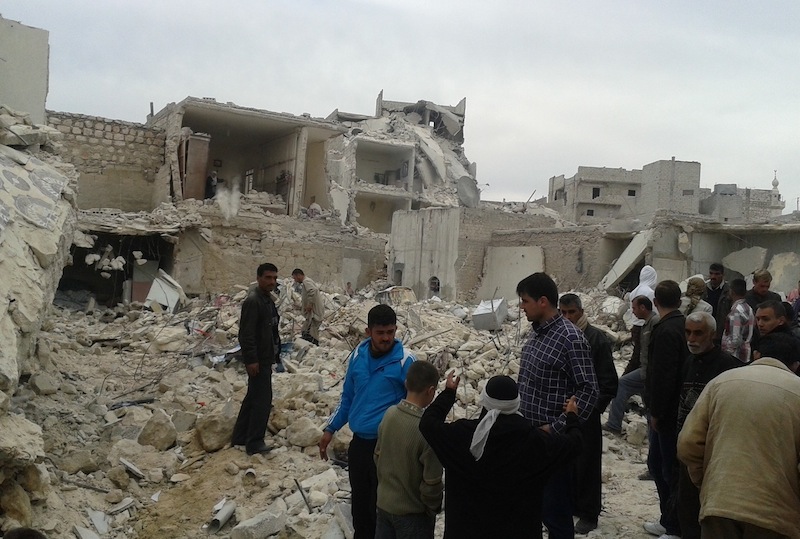Over the past year, the Syrian government has used missiles, air-dropped bombs, mortars, rockets, artillery and other explosive weapons with wide-area effects, causing multiple civilian casualties and destroying homes and communities. Due to the nature of the weapons and the locations targeted, these kinds of attacks kill and injure civilians, damage infrastructure, and leave behind explosive remnants of war. Many now agree that it is now time for action to curb the use of explosive weapons with wide-area effects in populated areas.
According to the Syrian Network for Human Rights, the government used at least 131 long-range surface-to-surface missiles between December 2012 and early July. Human Rights Watch investigated nine apparent ballistic missile attacks by the Syrian government on residential areas that killed at least 215 civilians, including 100 children, and caused significant civilian damage with no apparent military advantage. According to the non-governmental organization (NGO), “the repeated use of these high explosive weapons with wide-area effects in areas populated by civilians strongly suggests that the military willfully used methods of warfare incapable of distinguishing between civilians and combatants, a serious violation of international humanitarian law.”
In the streets of communities in Iraq, Pakistan, Afghanistan, Nigeria and elsewhere, car bombs, roadside bombs, suicide bombers, and other types of improvised explosive devices (IEDs) used are causing numerous civilian casualties. A survey by Action on Armed Violence of more than 500 English-language media sources found that in 2012 more than half of all civilian casualties recorded from explosive weapons were caused by IEDs.
The use of explosive weapons in populated areas is also displacing communities. Save the Children interviewed more than 130 Syrian children and their families between September 2012 and March 2013 and reported that nearly all cited the constant threat and stress of shelling, bombing and bombardment of their homes, schools and communities as their primary reason for fleeing the country. Many had seen friends and relatives killed by explosive weapons, while some children had been injured themselves and spoke of their schools and local hospitals being attacked.
Two types of explosive weapons—antipersonnel landmines and cluster munitions—have been prohibited due to their devastating impact on civilian populations, while the use of other explosive weapons with wide area effects is subject to the laws of war.
International humanitarian law prohibits direct attacks against civilian objects, such as homes, places of worship, hospitals, and schools, unless they are being used for military purposes. A warring party is obliged to use means and methods capable of distinguishing between civilians and combatants, an attack should not cause disproportionate damage to civilian lives and property, and the party using the weapons should take all feasible precautions to minimize civilian harm.
Yet explosive weapons with wide-area effects continue to cause many casualties when used in areas with concentrations of civilians. Concern over the humanitarian cost is mounting and increasingly this is seen as an issue that must be addressed.
In 2011 a group of non-governmental organizations established the International Network on Explosive Weapons (INEW) to provide a coordinated civil society response. INEW calls on states and other actors to acknowledge and “strive to avoid” the harm caused by such use of these weapons, gather and make available any relevant data, realize the rights of victims and survivors, and develop stronger international standards in this area.
According to the International Committee of the Red Cross (ICRC), “due to the significant likelihood of indiscriminate effects and despite the absence of an express legal prohibition for specific types of weapons, the ICRC considers that explosive weapons with a wide impact area should be avoided in densely populated areas.”
UN Secretary-General Ban Ki-moon has described this challenge as “highly problematic” and, in his 2012 report on the protection of civilians in armed conflict, urged all actors “to refrain from using explosive weapons with a wide-area impact in densely populated areas.”
According to INEW, so far around 30 countries have expressed concern about this issue, mostly in the context of the UN Security Council debates on protection of civilians: Australia, Austria, Azerbaijan, Bangladesh, Belgium, Benin, Chile, Finland, Gabon, Guatemala, Germany, Holy See, Japan, Liechtenstein, Lithuania, Luxembourg, Malaysia, Mexico, New Zealand, Nigeria, Norway, Qatar, Slovenia, Sweden, Switzerland, Togo, Tunisia, and the United States.
The next UN Security Council debate will take place on 19 August 2013.
For more information, please see the website of the International Network on Explosive Weapons, which is coordinated by UK NGO Article 36.
Photo: Aftermath of an airstrike in Aleppo, March 2013 (c) Human Rights Watch


Leave a Reply